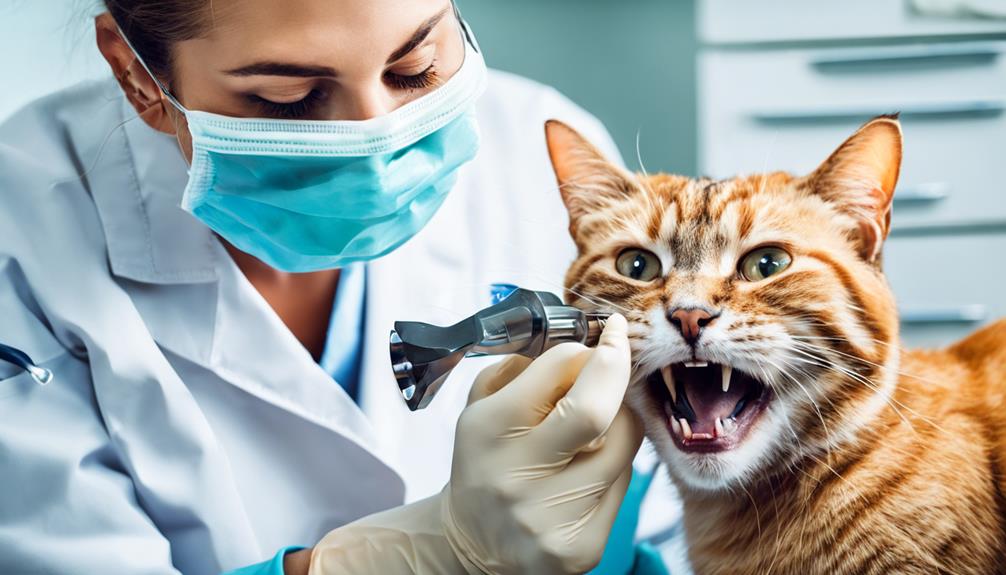Strategies for Extending Your Cat's Lifespan
Like a well-oiled machine, your cat's health requires maintenance and care to keep running smoothly. Understanding the key strategies for extending your feline companion's lifespan is crucial.
From diet choices to regular check-ups, each aspect plays a vital role in ensuring a long and healthy life for your beloved pet. But there's one often-overlooked factor that could make a significant difference.
Adopting a Healthy Diet
To ensure your cat's longevity, prioritize feeding them a well-balanced diet rich in essential nutrients. Meal planning plays a crucial role in maintaining your feline companion's health. Cats are obligate carnivores, meaning they require a diet high in animal-based proteins. When meal planning for your cat, focus on providing them with high-quality commercial cat food or a balanced homemade diet approved by a veterinarian. Ensure that the diet includes the necessary vitamins, minerals, and taurine essential for your cat's overall well-being.
Incorporating nutritional supplements into your cat's diet can also be beneficial. However, it's essential to consult with a vet before adding any supplements to ensure they're safe and appropriate for your cat's specific needs. Omega-3 fatty acids, for example, can help maintain healthy skin and a shiny coat. Probiotics may aid in digestion and strengthen the immune system. These supplements can complement your cat's diet, but moderation and professional guidance are key.
Regular Veterinary Check-ups
Regular veterinary check-ups are essential for maintaining your cat's health and detecting any potential issues early on. Preventive care plays a crucial role in ensuring your feline companion lives a long and healthy life. Here are some key points to consider when it comes to regular veterinary check-ups:
- Schedule Wellness Exams: Regular wellness exams help your vet assess your cat's overall health and catch any problems early.
- Vaccinations: Keeping your cat up to date on vaccinations is vital for preventing common diseases.
- Parasite Control: Regular check-ups help monitor and treat any parasite infestations such as fleas, ticks, and worms.
- Dental Care: Your vet can examine your cat's teeth and gums during check-ups to prevent dental issues.
- Senior Cat Health: As your cat ages, more frequent veterinary check-ups may be necessary to address age-related health concerns.
Providing Mental Stimulation
Ensuring your cat receives mental stimulation is essential for maintaining their overall well-being and happiness. Interactive toys are a fantastic way to engage your feline friend's mind and keep them entertained. Toys that mimic prey-like movements or allow your cat to chase and pounce can provide hours of mental stimulation. Puzzle feeders are another excellent tool to keep your cat's brain active. These feeders make mealtime more challenging by requiring your cat to work for their food, simulating their natural hunting instincts.
Introducing new toys and rotating them regularly can prevent boredom and encourage curiosity in your cat. Cats are intelligent animals that crave mental challenges, so offering a variety of interactive toys can help prevent behavioral issues that may arise from lack of stimulation. Puzzle feeders not only provide mental enrichment but also help slow down fast eaters and prevent obesity.
Maintaining a Healthy Weight
Keeping your cat at a healthy weight is vital for their overall well-being and longevity. Obesity in cats can lead to various health issues, impacting their quality of life and reducing their lifespan. Here are some tips to help you maintain your cat's weight:
- Regular Exercise: Engage your cat in play sessions using interactive toys to keep them active and help burn calories.
- Balanced Diet: Provide a high-quality, balanced diet specifically formulated for your cat's age and weight management needs.
- Monitor Food Intake: Practice portion control by measuring your cat's food to avoid overfeeding.
- Avoid Free Feeding: Instead of leaving food out all day, establish set mealtimes to control how much your cat is eating.
- Consult Your Vet: If you're unsure about your cat's ideal weight or how much to feed them, consult your veterinarian for guidance.
Creating a Safe Environment
To promote your cat's safety and well-being, establish a secure living environment. Indoor hazards pose significant risks to your feline friend. Keep electrical cords hidden or secured to prevent chewing. Ensure windows and balcony doors are securely closed or have screens to prevent falls. Toxic plants are another danger to be mindful of. Common household plants like lilies, philodendrons, and aloe vera can be toxic to cats if ingested. Be sure to research which plants are safe and remove any that are harmful.
Additionally, be cautious with household chemicals and cleaners. Store them in secure cabinets out of your cat's reach. Keep small objects that could be choking hazards, like rubber bands or small toys, out of their access. Regularly check for any small spaces where your cat could get stuck or hide.
Creating a safe environment also involves providing a designated space for your cat to retreat to when feeling overwhelmed. This could be a cozy cat tree, a hiding spot, or a comfortable bed in a quiet area of your home. By addressing indoor hazards, removing toxic plants, securing potentially harmful items, and offering a safe space, you can significantly reduce the risks to your cat's well-being and help them live a longer, healthier life.
Exercise and Playtime
Looking to enhance your cat's overall well-being and longevity? Exercise and playtime are crucial aspects of your feline friend's health. Regular physical activity not only helps maintain a healthy weight but also promotes mental stimulation and prevents behavioral issues. Here are some tips to keep your cat active and engaged:
- Interactive Toys: Invest in toys that require your cat to move and think, such as puzzle feeders or laser pointers. These toys can provide mental stimulation and encourage physical activity.
- Daily Activities: Engage your cat in daily play sessions. Set aside time each day to interact with your cat using toys like feather wands or catnip mice. This helps strengthen your bond and keeps your cat physically active.
- Create a Play Area: Designate a space in your home where your cat can climb, scratch, and explore. Cat trees, scratching posts, and hiding spots can enrich your cat's environment and encourage movement.
- Rotate Toys: Keep your cat's interest piqued by rotating their toys regularly. Introducing new toys or hiding familiar ones can prevent boredom and encourage play.
- Outdoor Enclosures: If possible, create a safe outdoor space or use a catio for your cat to explore. Outdoor time can provide additional stimulation and exercise opportunities for your feline companion.
Dental Care Importance

Enhance your cat's overall health and lifespan by prioritizing dental care. Just like humans, cats require proper dental hygiene to prevent dental issues and maintain their feline oral health. Neglecting your cat's dental care can lead to various problems, including plaque buildup, gum disease, and tooth decay.
Preventing plaque buildup is crucial in ensuring your cat's teeth and gums stay healthy. Plaque is a sticky film of bacteria that forms on the teeth and can harden into tartar if not removed regularly. This can irritate the gums and lead to periodontal disease, causing pain and potential tooth loss for your furry friend. By implementing a regular dental care routine, such as brushing your cat's teeth or providing dental treats, you can help prevent plaque buildup and maintain their oral health.
Regular dental check-ups with your veterinarian are also essential for monitoring your cat's dental health and addressing any potential issues early on. Your vet can perform professional cleanings and identify signs of dental problems that may not be visible to the naked eye. By staying proactive and attentive to your cat's dental care needs, you can significantly contribute to extending their lifespan and ensuring they live a happy and healthy life.
Monitoring for Early Signs
Keeping a close eye on your cat's behavior and eating habits can help you detect early signs of potential dental issues. It's crucial to be attentive to any changes in your cat's routine to catch problems early on. Here are some key points to consider:
- Behavioral Changes: Monitor any shifts in your cat's behavior, such as increased aggression, hiding, or sudden changes in social interaction. These could be early indicators of underlying medical conditions that need attention.
- Medical Conditions: Keep an eye out for symptoms like excessive thirst, frequent urination, or changes in bathroom habits. These signs could signify medical issues that require prompt veterinary care.
- Age-Related Issues: As your cat ages, pay extra attention to mobility changes, weight fluctuations, and overall energy levels. These could be signs of age-related conditions that need to be addressed.
- Nutrition Requirements: Ensure your cat's diet is appropriate for their age and health status. Adjust their food intake as needed to maintain a healthy weight and prevent nutritional deficiencies.
- Regular Veterinary Check-ups: Schedule routine check-ups with your veterinarian to catch any potential problems early and keep your cat in optimal health. Regular dental cleanings can also help prevent oral health issues.
Frequently Asked Questions
Can Cats Live Longer if They Are Kept Indoors Versus Being Allowed to Roam Outside?
Keeping your cat indoors can contribute to a longer lifespan compared to letting them roam outside. Indoor cats face fewer risks like traffic accidents, predators, and diseases. Providing proper exercise and nutrition can also enhance longevity.
Are There Any Supplements or Vitamins That Can Help Extend a Cat's Lifespan?
If you're looking to boost your cat's lifespan, nutritional supplements can play a key role. Consider incorporating supplements like Omega-3 fatty acids and antioxidants to support your cat's overall health.
Additionally, making smart lifestyle choices such as providing a balanced diet, regular exercise, and routine veterinary check-ups can also contribute to keeping your feline friend happy and healthy for years to come.
How Does a Cat's Stress Levels Impact Their Overall Lifespan?
When it comes to your cat's stress levels and their overall lifespan, managing stress is crucial. Feline behavior can be greatly affected by stress, impacting their health and longevity.
By focusing on stress management techniques like providing a safe environment, regular playtime, and a balanced diet, you can help your cat lead a happier and healthier life.
Prioritizing your feline friend's well-being can positively influence their lifespan.
Are There Specific Breeds of Cats That Tend to Live Longer Than Others?
Certain cat breeds tend to live longer than others due to genetic factors and environmental influences. Factors like genetic predispositions to certain health conditions or breed-specific traits can impact lifespan.
Similarly, environmental factors such as diet, exercise, and overall care play a significant role. Breeds like Siamese, Ragdoll, and Russian Blue are known for their longevity.
Providing a healthy environment and proper care can help maximize a cat's lifespan regardless of breed.
Should I Be Concerned About My Cat's Exposure to Household Toxins and Chemicals Affecting Their Lifespan?
You should definitely be concerned about your cat's exposure to household toxins. Indoor cats are at risk of ingesting or inhaling harmful chemicals found in cleaning products, plants, and more. Take precautions to keep these toxins out of reach and ensure good ventilation.
Outdoor cats may encounter pesticides or other dangers. Safeguard your feline friend by being mindful of their environment and providing a safe, toxin-free space.
Conclusion
By following these strategies, you can help extend your cat's lifespan and ensure they live a long and healthy life.
Remember to provide a balanced diet, regular vet check-ups, mental stimulation, and plenty of exercise.
Keep an eye out for any early signs of health issues and create a safe environment for your feline friend.
With proper care and attention, you can enjoy many happy years together with your beloved cat.
